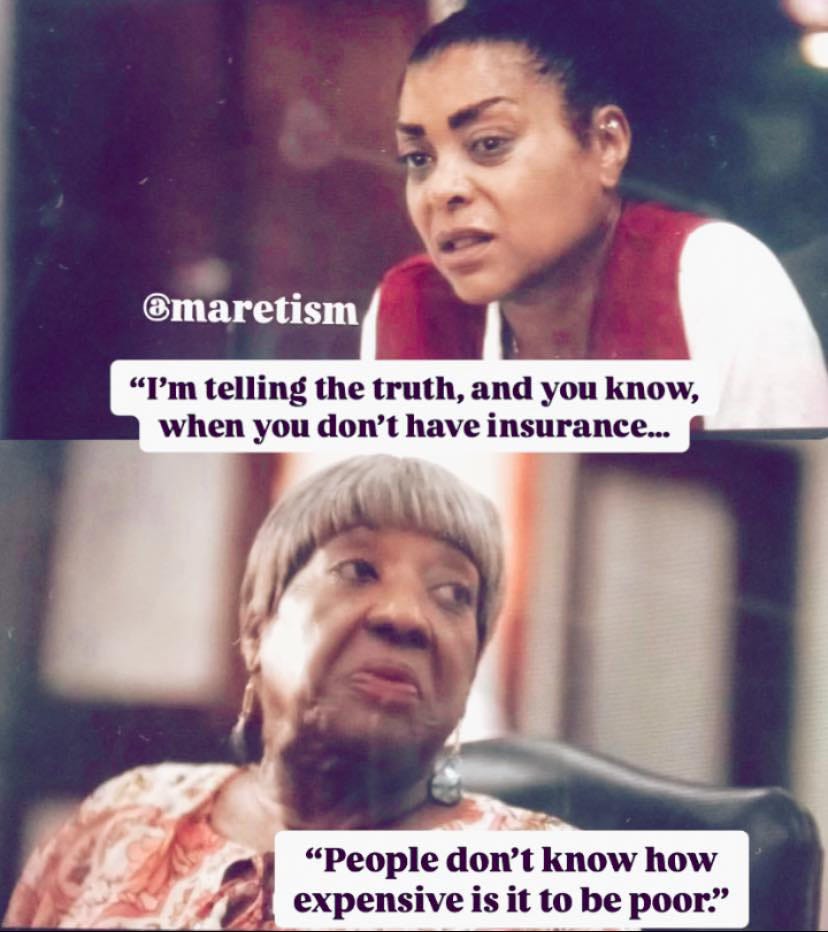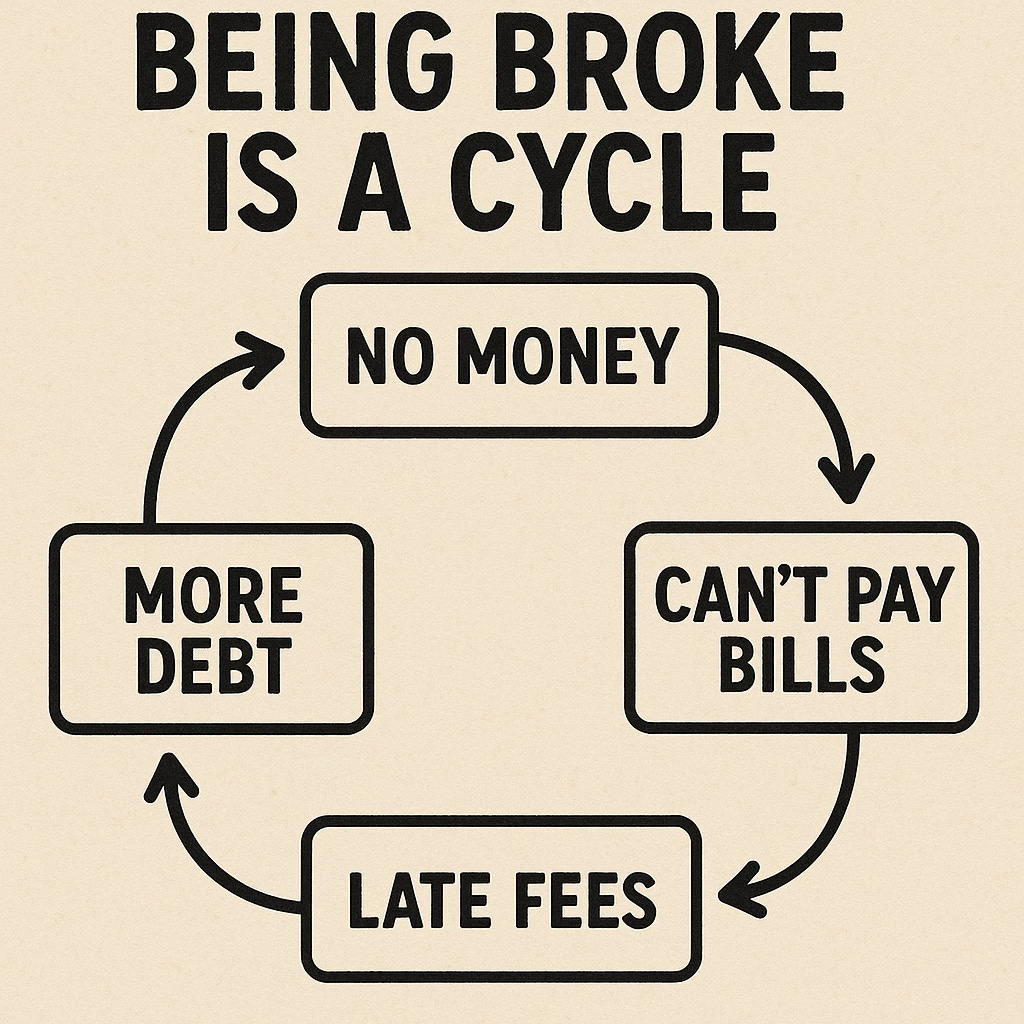🧾 The Hidden Cost of Survival: Why Being Poor Is So Damn Expensive
“People don't know how expensive it is to be poor.” — Older woman to Janiyah (Taraji P. Henson), Straw by Tyler Perry
Introduction
Some truths don’t need long explanations — they just hit. That one line from Tyler Perry’s film Straw, delivered by Taraji P. Henson’s character, Janiyah, echoed through my soul like something I didn’t know I needed to hear aloud:
“People don’t know how expensive it is to be poor.”
It’s more than a quote. It’s a summary of a lived reality most people wouldn’t choose to understand unless they’ve been there themselves. For me, this isn’t theoretical. It’s personal.
In this post, I’m unpacking how poverty costs more than people think — not just in money, but in opportunities, dignity, and sometimes even safety. And I’ll share a piece of my journey navigating those costs while pursuing a graduate degree at one of the most prestigious universities in the country.
⸻
The Financial Tax of Being Broke
Let’s start with the obvious: if you’re poor, everything costs more.
Don’t have good credit? You’ll pay higher interest on everything from car loans to credit cards. Need a phone? That’ll require a deposit. Trying to move into an apartment? Be prepared to fork over multiple months of rent up front — if your application isn’t denied altogether.
In most cases, the less you have, the more you’re forced to spend.
And then there’s the bank. If you’re living paycheck to paycheck, a single unexpected charge can throw your balance negative. Once that happens, cue the overdraft fees: $35 for being $5 short, and maybe another $35 when that next automatic payment hits. Some banks even charge monthly maintenance fees just because your account balance isn’t high enough. You’re literally taxed for being broke.
⸻
My Reality: Hotels, Hustles, and Hard Lessons
While finishing my master’s in journalism at Georgetown University, I wasn’t living the “D.C. grad school” fantasy most people imagine. I was living out of hotels, scraping together enough money every week to pay nightly or weekly rates — rates that added up to more than double what rent for a small apartment would’ve cost.
But I didn’t have a choice. My credit wasn’t strong enough to qualify for a lease. I didn’t have a consistent enough income to pass the checks. So, I paid more — just to have a roof over my head. That’s the insane paradox: being too broke to afford a cheaper option.
When I couldn’t afford even that, I stayed with people who didn’t have my best interest at heart. People who were selling drugs out of the house. People who verbally disrespected me. People who hit me. I endured situations that chipped away at my dignity and peace of mind, all because I didn’t have anywhere else to go. And let me be clear: that’s the emotional cost of poverty no one likes to talk about.
⸻
The Moral Tax of Poverty
One of the cruelest parts of poverty is the way it forces you to compromise yourself. You start making decisions based not on what’s best for you, but on what’s possible — and sometimes, what’s survivable.
You stay in environments that are toxic because splitting rent is cheaper than running. You let people speak to you any kind of way because you’re depending on their roof. You might take dangerous jobs, sell things you’d rather not, or tolerate behavior that goes against every fiber of your being — not because you’re weak, but because you’re trying to make it out.
This isn’t just a financial cost. It’s a spiritual one.
⸻
The Cycle That Never Ends
They say hard work fixes everything. But what they don’t tell you is that poverty turns every setback into a trapdoor.
Get sick? That’s a missed shift — and a missed paycheck. Miss rent? That’s an eviction on your record — and an even harder time finding housing next time. Can’t afford child care? You can’t work. Can’t work? You lose what little you have. It’s a cycle that eats people alive and then blames them for not trying hard enough.
⸻
So, What Now?
We live in a society that punishes people for being broke and then shames them for the results of that punishment. Meanwhile, the systems that exploit the poor — predatory lenders, cash bail, payday loans, corporate landlords, and even some banks — are profiting off that struggle every day.
And it’s why I wrote this piece. Because I want people to understand that poverty is not just about not having money. It’s about being taxed, trapped, and emotionally drained by a system that was never built to help us out — only to keep us in.
⸻
Final Thoughts
“To be poor is expensive” isn’t just a quote from a movie. It’s a truth that millions of people live every day — and it’s one I’ve survived firsthand.
But telling these stories matters. Because awareness breeds change. And as a journalist, as a Black woman, as someone who has clawed her way through the mud while society tried to push my head under water — I’m here to remind you:
The problem isn’t poor people. The problem is what it costs to be one.





